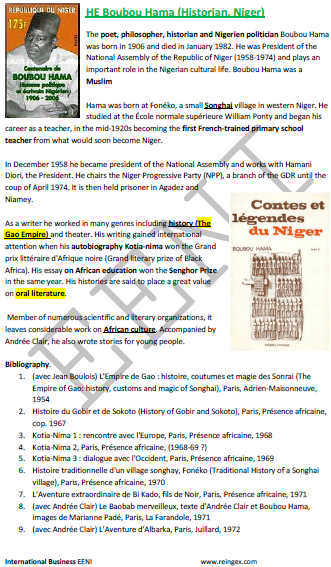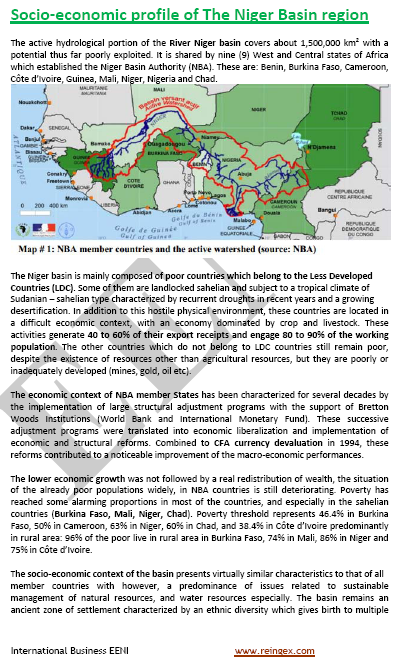Business in Niger, Niamey, Uranium
Niger (Foreign Trade, Logistics): largest reserves of uranium in the World. Petrol
The Republic of Niger: The largest uranium reserves in the World.
- The Republic of Niger is “one of most exciting emerging countries”, according to UNDP (United Nations Development Program)
- The Economy of Niger is based principally on crops, livestock, and uranium (30% of exports, the largest resources in the World)

- Introduction to the Republic of Niger (West Africa)
- Economy of Niger
- International Trade of Niger
- Transport and Logistics
- Business and Investment Opportunities in Niger:
- Agribusiness
- Extractive industry (petrol and gas)
- Manufacturing
- Services
- Case Study: uranium in Niger
- Access to the Nigerien Market
- Business Plan for Niger


The educational aims of the Subject “Foreign Trade, Logistics and Business in Niger” are:
- To analyze the Nigerien Economy, Logistics and Global Trade
- To conduct research on business opportunities in Niger
- To explore the Nigerien trade relations with the student's country
- To learn about Nigerien Trade Agreements
- To develop a business plan for the Nigerien Market

The Subject “Foreign Trade, Logistics and Business in Niger” is included within the curriculum of the following academic programs at EENI Global Business School:
Doctorate in African Business.

Master in Business in Africa, International Business.

Languages:  or
or  Niger
Niger  Niger
Niger  Níger.
Níger.
- Subject Credits “Doing Business in Niger”: 1

Area of Knowledge: Africa.
International Trade, Logistics and Business in Niger - Niamey.

- Trans-African Roads
- Nearest Ports


Nigerien Preferential Access and Trade Agreements:
- Niger and the West African Economic Area
- Niger withdrew from the Economic Community of West African States (ECOWAS) in 2021
- West African Economic and Monetary Union (WAEMU)
- Community of Sahel-Saharan States (CEN-SAD)
- African Continental Free Trade Area
- Niger-U.S.
- AGOA United States
- US-WAEMU Agreement
- Africa-EU Partnership
- G5-Sahel
- Niger Basin Authority
- Islamic Trade Preferential System
- Harmonization of Business Law in Africa (OHADA)

- World Trade Organization (WTO)
- Agreement on Trade in Services (GATS)
- Agreement on Sanitary Measures
- Agreement on Technical Barriers to Trade
- Agreement on Preshipment Inspection
- Agreement on Safeguards
- Trade Facilitation Agreement
- World Customs Organization (WCO)
- Kyoto Convention
- Rotterdam Rules


- Economic Commission for Africa
- African Union
- AU Convention on Preventing and Combating Corruption
- AUDA-NEPAD
- Africa Agriculture Development Programme
- African Development Bank
- Africa-Asia Partnership
- Africa-India Cooperation
- Africa-BRICS
- Africa-Turkey Partnership
- China-Africa Cooperation

- Afro-Arab Cooperation
- Arab Bank for Africa (BADEA)
- Organization of Islamic Cooperation (OIC)
- Islamic Development Bank

- United Nations
- World Bank
- World Trade Organization (WTO)
- International Monetary Fund
- Area of the Republic of Niger: 1,267,000 km² (landlocked country)
- Boubou Hama (Nigerien, Historian)
- Nigerien Population: 19.8 million people
- Capital of Niger: Niamey (770,000 people)
- Largest cities of Niger: Diffa, Dosso, Maradi, Tahoua, Tillabéri, Agadez, and Zinder
- Nigerien official language: French
- Other local languages: Hausa, Tamacheq, and Zarma
- Nigerien Independence: 1960 (from France)
- The Republic of Niger is a Semi-Presidential Democratic Republic
- Borders of the Republic of Niger: Algeria, Libya, Chad, Nigeria, Benin, Burkina Faso, and Mali
More information about Niger (EENI African Business Portal).
Religions in Niger:
- Islam (96% of the Nigerien population, 11 million)
- African Traditional Religions
Niger belongs to the West African Economic Area.
Economy of Niger
- The Republic of Niger has two Uranium mines: COMINAK and SOMAIR (French consortium). enterprises from China and Canada are studying the viability of open new mines
- The Nigerien real GDP growth: 6%, driven mainly by the agricultural sector
- Agriculture: 33% of Nigerien GDP
- Services: 50.6%
- Industry: 14%
- The population of Niger lives mainly from agriculture, livestock, fisheries, and handicrafts
- The Nigerien currency: CFA Franc
- Niger has huge petroleum reserves
- The Nigerian Society of Petroleum Products is the main pillar of the country's energy policy
- Top Nigerien economic sectors: petroleum, gold, and aluminum
- Niger is the fourth uranium producer in the World

International Trade of Niger
- Top Nigerien exports: uranium ore, livestock, and cowpeas
- Top Nigerien exports partners: Nigeria, the United States, India, Italy, China, and Ghana
- Top Nigerien imports: foodstuffs, machinery, and vehicles
- Top Nigerien imports partners: France, China, Nigeria, Togo, and Ivory Coast

(c) EENI Global Business School (1995-2025)
Top of this page








 WhatsApp
WhatsApp
